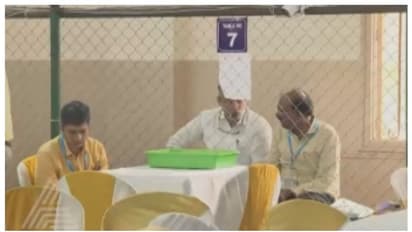Lok Sabha Election Results 2024: What happens inside a counting centre

Synopsis
Assistant Returning Officers also oversee the process, particularly when an RO is responsible for more than one seat. Counting officials, appointed by the RO, handle the actual vote tallying.
After 642 million voters cast their votes over the past month and a half in the seven-phase Lok Sabha elections, the counting of votes commenced on Tuesday (June 4) at 8 AM. This colossal democratic exercise sees as many as 8,360 candidates competing for 543 parliamentary seats.
Following the completion of voting, the counting process begins under the supervision of the Returning Officer (RO) for each seat, usually nominated by the Election Commission and often the District Magistrate. The votes are counted in the presence of contestants and their election agents to ensure transparency.
Assistant Returning Officers also oversee the process, particularly when an RO is responsible for more than one seat. Counting officials, appointed by the RO, handle the actual vote tallying.
Each counting table includes a supervisor, typically a gazetted officer, a counting assistant, counting staff from Group D employees, and a micro observer responsible for maintaining the integrity of the process. Officials are selected from a database using centrally developed software by the state's Chief Electoral Officer.
Who are allowed inside the counting centers?
Supervisors, assistants, micro-observers, individuals, and observers authorized by the electoral body, and government employees on election duty are permitted inside the counting centers. Candidates are allowed to appoint as many counting agents as there are counting tables.
However, police officers and government ministers are not considered "public servants" in this context and are not allowed inside. Mobile phones are also prohibited within the counting centers.
A typical counting hall can have up to 14 counting tables, in addition to the RO's table.
Counting of Votes
Votes are categorised into two types: those cast via Electronic Voting Machines (EVMs) and postal ballots, each counted separately. According to the Chief Election Commissioner, EVM counting begins at 8:30 AM, half an hour after the postal ballots are counted.
The strong rooms, where EVMs are stored post-voting, are opened in the presence of the Observer, RO/ARO, and the candidates or their election agents, ensuring a secure and transparent counting process.
Stay updated with the Breaking News Today and Latest News from across India and around the world. Get real-time updates, in-depth analysis, and comprehensive coverage of India News, World News, Indian Defence News, Kerala News, and Karnataka News. From politics to current affairs, follow every major story as it unfolds. Get real-time updates from IMD on major cities weather forecasts, including Rain alerts, Cyclone warnings, and temperature trends. Download the Asianet News Official App from the Android Play Store and iPhone App Store for accurate and timely news updates anytime, anywhere.